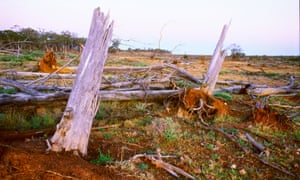WWF rates Australia a zero due to the absence of biodiversity measures in our Paris climate change commitments
Australia has been named as one of the worst performers among a group
of 100 nations due to the absence of biodiversity measures in our
climate change commitments, according to a new report by WWF.
The report, published this week during the conference of parties to the Convention on Biological Diversity in Egypt, examines whether climate commitments from countries under the Paris agreement also offer benefits for nature and biodiversity.
While countries aren’t required to include biodiversity measures in their nationally determined contributions (NDCs), some activities, such as reducing deforestation and preserving habitat, have dual benefits for the climate and nature.
WWF is calling for more integration between between the two.
“Given that resources are finite and that action in one area can have
a knock-on effect in another, the best way forward is to take
integrated action on climate, development and nature,” the report
states.The report, published this week during the conference of parties to the Convention on Biological Diversity in Egypt, examines whether climate commitments from countries under the Paris agreement also offer benefits for nature and biodiversity.
While countries aren’t required to include biodiversity measures in their nationally determined contributions (NDCs), some activities, such as reducing deforestation and preserving habitat, have dual benefits for the climate and nature.
WWF is calling for more integration between between the two.
“Climate and biodiversity are intrinsically linked as climate change is one of the underlying drivers of habitat and biodiversity loss, while the deterioration of ecosystems and their services contributes to rising greenhouse gas emissions.”
Australia was one of the worst performers among the group. Along with the United States and Canada, Australia was rated a zero because none of its commitments involved biodiversity measures.
“Australia’s NDC is brief and focused on economy wide targets, rather than detailed plan implementation,” the report states.
“In 2015, the government released their national climate resilience strategy, which better reflects an integration of biodiversity considerations into climate policy.”
By comparison, the report said countries in the Caribbean, Latin America, south-east Asia and the Pacific were better at considering the significance of biodiversity, nature and forestry measures as part of their climate response.
Martin Taylor, a conservation scientist with WWF, said countries such as Indonesia were taking steps to reduce deforestation but “Australia is doing none of that”.
“There’s no commitment to end deforestation. In fact we’ve had an explosion in deforestation recently,” he said.
“We’re not performing at all because climate isn’t even mentioned in the NDC to the climate agreement.”
The report was released as countries prepared on Thursday morning in Sharm El-Sheikh to agree on a pathway toward a new global framework for protecting biodiversity.
New targets for people and nature are set to be established at a summit in Beijing in 2020 which conservationists hope will mobilise countries to do more about the global extinction crisis.
“It is clear from the meeting in Egypt that Australia is going to need to ramp up its policy ambition if we are to move off of the bottom ranks for protecting nature and wildlife,” said James Trezise, a policy analyst with the Australian Conservation Foundation.
“There is an important opportunity for both major parties to think about how their policies can contribute to a new deal for people and nature, especially in the context of a likely May election.”
Comment was sought from the environment minister, Melissa Price

No comments:
Post a Comment